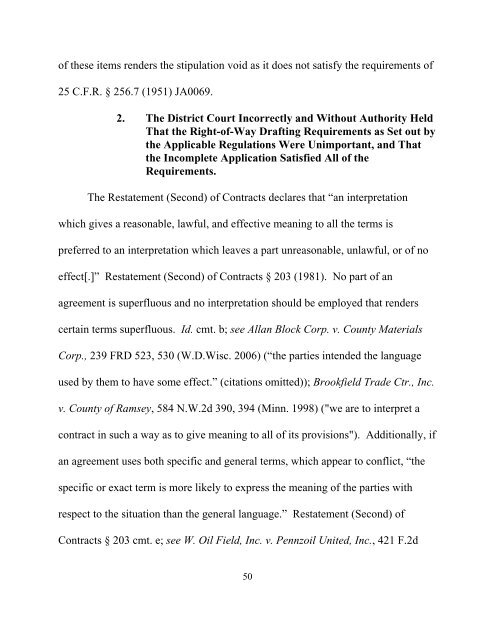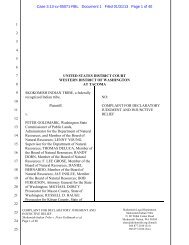Appellant Brief - Turtle Talk
Appellant Brief - Turtle Talk
Appellant Brief - Turtle Talk
Create successful ePaper yourself
Turn your PDF publications into a flip-book with our unique Google optimized e-Paper software.
of these items renders the stipulation void as it does not satisfy the requirements of<br />
25 C.F.R. § 256.7 (1951) JA0069.<br />
2. The District Court Incorrectly and Without Authority Held<br />
That the Right-of-Way Drafting Requirements as Set out by<br />
the Applicable Regulations Were Unimportant, and That<br />
the Incomplete Application Satisfied All of the<br />
Requirements.<br />
The Restatement (Second) of Contracts declares that “an interpretation<br />
which gives a reasonable, lawful, and effective meaning to all the terms is<br />
preferred to an interpretation which leaves a part unreasonable, unlawful, or of no<br />
effect[.]” Restatement (Second) of Contracts § 203 (1981). No part of an<br />
agreement is superfluous and no interpretation should be employed that renders<br />
certain terms superfluous. Id. cmt. b; see Allan Block Corp. v. County Materials<br />
Corp., 239 FRD 523, 530 (W.D.Wisc. 2006) (“the parties intended the language<br />
used by them to have some effect.” (citations omitted)); Brookfield Trade Ctr., Inc.<br />
v. County of Ramsey, 584 N.W.2d 390, 394 (Minn. 1998) ("we are to interpret a<br />
contract in such a way as to give meaning to all of its provisions"). Additionally, if<br />
an agreement uses both specific and general terms, which appear to conflict, “the<br />
specific or exact term is more likely to express the meaning of the parties with<br />
respect to the situation than the general language.” Restatement (Second) of<br />
Contracts § 203 cmt. e; see W. Oil Field, Inc. v. Pennzoil United, Inc., 421 F.2d<br />
50

















